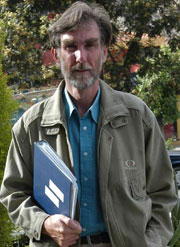Persian Empire
Allen, J.M.
J.M. Allen, a Scotsman, worked in the 1970’s as an expert in satellite mapping with the British Royal Air Force. He was also a researcher of ancient measuring systems. The combination of these two interests led to a  conviction that Plato’s Atlantis could be matched with a site in the Altiplano of Bolivia,which he outlined in his book Atlantis: The Andes Solution[0040]. Coincidentally, in the same year, Tony Morrison published an article entitled The Bolivian Atlantis(k-n).
conviction that Plato’s Atlantis could be matched with a site in the Altiplano of Bolivia,which he outlined in his book Atlantis: The Andes Solution[0040]. Coincidentally, in the same year, Tony Morrison published an article entitled The Bolivian Atlantis(k-n).
Allen’s case is primarily based on the discovery of a vast canal network in the region together with aerial photography indicating concentric rings on the ground. His chosen site of Pampa Aullagus contains red, white and black rock reminiscent of the Atlantean masonry described by Plato.
In a TV documentary that focused on his theory it was suggested that the other nine kingdoms that comprised the Atlantean domain were probably to be found in South America.
>>Allen has also written Decoding Ezekiel’s Temple(a), which discusses ancient measuring methods and concluded that the temple described by Ezekiel was in fact a Babylonian ziggurat(o).<<
In 2008 Allen delivered three papers to the 2nd Atlantis Conference[750] in Athens. All three papers are available online in a pdf format(g)(h)(i).
2009 saw the publication of a second book, Atlantis: Lost Kingdom of the Andes[207] designed to reinforce his original thesis of Atlantis on the Altiplano of Bolivia. A trilogy was completed in 2010 with the publication of The Atlantis Trail (Kindle)which records his travels in the Andes in search of Atlantis(b). A small hotel is now being built in Pampa Aullagus to cater for increased number of tourists, no doubt in response to the work of Jim Allen.
In 2012, Allen published Atlantis and the Persian Empire, which is available to download as a free pdf file(c). This work is really just a reprise of his earlier writings. In this somewhat provocatively titled book he claims that Plato took the geography of the Atlantis story from the Andes, a theme he has been promoting since 1998.
However, he also maintains that the military history in Plato’s narrative was based on the war between Athens and the Persian Empire in the 5th century BC. Another of his more exotic claims is that the Sea Peoples were from South America. Allen devotes a considerable part of the book to ancient South American metrology and ends with a comparison of relative merits of the Altiplano versus Santorini as the inspiration behind Plato’s Atlantis story.
An extensive critique of Allen’s theories is offered by Timothy J.Stephany on his website(e). Nevertheless, although I consider Allen’s basic theory regarding Atlantis unacceptable, I find that part of his website showing images(f) of an extensive range of artefacts demonstrate most eloquently that South American civilisation was heavily influenced by distant cultures, both east and west.
Support for Allen’s views has continued into 2013(d), despite those elements of his theory that still conflict with Plato’s narrative: dating, dimensions and the improbability of an invasion of the eastern Mediterranean by a force from the west coast South America! However, I have found that in 1900, Peter de Roo devoted chapter seven of his History of America before Columbus[890.v1] to a review of the idea that at various times native Americans travelled eastward and among other things were responsible for the settling of Egypt!
Allen’s site offers an extensive article on the life and research of Posnansky, including excerpts from his work(j).
(a) https://web.archive.org/web/20200811094111/http://www.atlantisbolivia.org/atlantisboliviapart1.htm
(b) https://web.archive.org/web/20180831185831/http://www.atlantisbolivia.org/theatlantistrail.htm
(d) https://beforeitsnews.com/beyond-science/2013/03/atlantis-in-south-america-the-evidence-2441492.html
(e) See: Archive 2237
(f) https://web.archive.org/web/20200629021253/http://www.atlantisbolivia.org/artefacts.htm
(g) https://web.archive.org/web/20200718165434/http://www.atlantisbolivia.org/athensfullpaper.pdf
(h) https://web.archive.org/web/20200626174734/http://www.atlantisbolivia.org/athensfullpaper2.pdf
(i) https://web.archive.org/web/20200714051300/http://www.atlantisbolivia.org/athensfullpaper3.pdf
(j) https://web.archive.org/web/20190717211749/http://www.atlantisbolivia.org/posnansky.htm
(l) https://web.archive.org/web/20110520012247/http://southamericanpictures.com/features/feat4/dawn.html
Hunt, August
August Hunt is an American freelance writer with a range of fictional and historical works to his name. His interests range across Arthurian literature, Celtic religion, mythology and folklore.
 In 2008 he published a new Atlantis theory on the Internet in which he linked the Persian Empire with Atlantis, with either Persepolis or Susa as the capital city of the Atlanteans. In 2010, he published The Real Moses and his God[747] and added A New Theory on Atlantis as a thirty-page appendix to it. The first is now available online(c), while his Atlantis theory has been published separately as a Kindle book[1413].
In 2008 he published a new Atlantis theory on the Internet in which he linked the Persian Empire with Atlantis, with either Persepolis or Susa as the capital city of the Atlanteans. In 2010, he published The Real Moses and his God[747] and added A New Theory on Atlantis as a thirty-page appendix to it. The first is now available online(c), while his Atlantis theory has been published separately as a Kindle book[1413].
Hunt argues that the 9,000 years since the Atlantean-Athenian War must be wrong since Athens did not exist until around 3000 BC. He then points out that the only conflict in which the Athenians defeated a large invading force was against the Persians at the Battle of Marathon in 490 BC. He strangely refers to the Atlantis story as a prophesy even though it was recorded by Plato over a century after the Battle of Marathon!
His most bizarre suggestion is that the 9,000 years quoted by Plato actually refers to the number of Athenians at the Battle of Marathon.
I was surprised to read[p138] that Hunt found “it odd that no one has thought to associate this geographical entity (Persia) with the Atlantis described by Plato”, since he was not the first to suggest a connection between the Persia-Athenian War and the war with Atlantis. Pierre-André Latreille (1762-1833) the French entomologist did so in 1819 when he concluded[1018] that Plato’s tale was a distorted version of the war with Persia. William Henry Babcock (1849-1922) also suggested that Plato’s Atlantis story incorporated details of the defeat of the Persians. Benjamin Jowett, held a related opinion. In 1953, the German classicist, Hans Diller, expressed the view that Plato’s Atlantis account was a fictional parallel with the Greco-Persian wars. In 2007 the prominent sceptic, Pierre Vidal-Naquet, also saw parallels with the Persian war in Plato’s narrative[580].
The Persian Wars took place between 500 and 449 BC, while Solon lived circa 630-560 BC, so it would not have been possible for Solon to refer to those conflicts in the Atlantis story that he brought from Egypt. We are therefore forced to conclude that Jowett and others were probably accusing Plato of lying about the provenance of the story, if not the actual contents of the narrative!
Jim Allen who advocates a Bolivian Atlantis has also written an extensive article(b) linking the Persian military details with the forces of Atlantis.
In view of all this it is hard to accept Hunt’s claim that he is the author of a new Atlantis theory.
>(b) https://web.archive.org/web/20200705143320/http://www.atlantisbolivia.org/armyandnavy.htm<
(c) https://mosesandhisgod.blogspot.ie/2016/10/v-behaviorurldefaultvmlo.html
